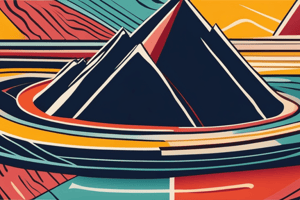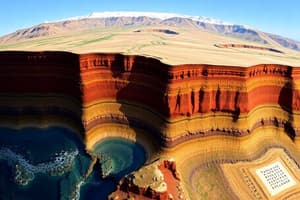Podcast
Questions and Answers
Which type of waves carry the energy of an earthquake?
Which type of waves carry the energy of an earthquake?
- Seismic waves (correct)
- Tectonic waves
- Volcanic waves
- Epicenter waves
What is the Pacific Ring of Fire?
What is the Pacific Ring of Fire?
- A region of major mountain belts surrounding the Pacific Ocean
- A region of active volcanoes in the Pacific Ocean
- A region of subduction zone volcanism surrounding the Pacific Ocean (correct)
- A region of earthquakes surrounding the Pacific Ocean
How are volcanoes generally described?
How are volcanoes generally described?
- Mountains that emit only lava from the interior of the Earth
- Mountains that emit only rocks and ashes from the interior of the Earth
- Mountains that emit only gases from the interior of the Earth
- Mountains that emit volcanic products like lava, rocks, ashes, and gases (correct)
What happens when tectonic plates move apart or diverge?
What happens when tectonic plates move apart or diverge?
What are the precautionary measures before, during, and after a volcanic eruption called?
What are the precautionary measures before, during, and after a volcanic eruption called?
Flashcards
Earthquake energy carrier
Earthquake energy carrier
Seismic waves carry the energy of an earthquake.
Pacific Ring of Fire
Pacific Ring of Fire
A region of subduction zone volcanism surrounding the Pacific Ocean.
Volcano description
Volcano description
Mountains that emit volcanic products like lava, rocks, ashes, and gases.
Tectonic plates moving apart
Tectonic plates moving apart
Signup and view all the flashcards
Volcanic safety protocols
Volcanic safety protocols
Signup and view all the flashcards
Study Notes
Earthquake Waves
- Seismic waves are responsible for carrying the energy released during an earthquake.
- There are two main types of seismic waves: Primary (P) waves, which are compressional and travel fastest, and Secondary (S) waves, which are shear waves that travel slower.
Pacific Ring of Fire
- The Pacific Ring of Fire is a horseshoe-shaped area in the Pacific Ocean characterized by high volcanic and seismic activity.
- It extends along the coasts of North and South America, Asia, and Australia, containing around 75% of the world's active volcanoes.
Characteristics of Volcanoes
- Volcanoes are generally described as openings in the Earth's crust through which molten lava, volcanic ash, and gases are expelled.
- They can be categorized into several types, including shield volcanoes (broad and gentle slopes), stratovolcanoes (steep, conical shapes), and cinder cone volcanoes (small, steep hills).
Tectonic Plate Divergence
- When tectonic plates move apart or diverge, magma rises from the mantle to fill the gap, often creating new oceanic crust.
- This process can lead to the formation of mid-ocean ridges and volcanic activity.
Precautionary Measures for Volcanic Eruptions
- Precautionary measures undertaken before, during, and after a volcanic eruption are known as volcanic hazard preparedness.
- These measures include evacuation plans, public education on eruption signs, and monitoring volcanic activity to mitigate risks to human life and property.
Studying That Suits You
Use AI to generate personalized quizzes and flashcards to suit your learning preferences.



